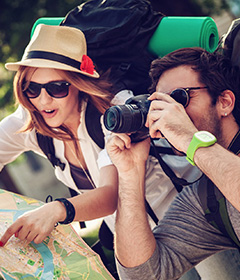Embarking on a backpacking adventure is a thrilling way to discover the world without breaking the bank. This form of travel offers unparalleled freedom, cultural immersion, and the opportunity to forge lifelong friendships. From the bustling streets of Southeast Asia to the historic charm of Eastern Europe, budget-conscious explorers can uncover hidden gems and create lasting memories. With careful planning and a spirit of adventure, backpacking opens doors to experiences that often elude traditional tourists.
Essential gear for Long-Term budget travel
Selecting the right gear is crucial for a successful backpacking journey. The cornerstone of any trip is a reliable, comfortable backpack. Opt for a 40-60 litre pack with adjustable straps and multiple compartments for easy organization. Durability is key, as your backpack will be your constant companion through various terrains and weather conditions.
Invest in a high-quality, lightweight sleeping bag suitable for the climates you’ll encounter. A silk sleeping bag liner adds warmth and can be used separately in warmer regions. Don’t forget a quick-dry travel towel – it’s compact and dries rapidly, perfect for life on the move.
Clothing choices should prioritize versatility and quick-drying fabrics. Pack items that can be layered and mixed-and-matched easily. Include a waterproof jacket, as unexpected showers can occur in any destination. Comfortable walking shoes are non-negotiable; break them in before your trip to avoid blisters on the road.
For tech essentials, a smartphone serves multiple purposes: communication, navigation, and photography. A portable charger ensures you’re never without power, while a universal adapter keeps your devices compatible across different countries. Consider a lightweight laptop or tablet if you plan to work remotely or document your journey extensively.
Maximizing hostel experiences: from booking to socializing
Hostels are the backbone of budget travel, offering affordable accommodation and a social atmosphere that’s perfect for meeting fellow backpackers. To make the most of your hostel stays, it’s essential to understand the ins and outs of this unique lodging option.
Navigating hostelworld and booking.com for best deals
When searching for hostels, utilize platforms like Hostelworld and Booking.com to compare prices and read reviews from other travelers. Look for hostels with high ratings for cleanliness, atmosphere, and location. Book in advance for popular destinations during peak seasons, but don’t be afraid to book on the go for more flexibility in your itinerary.
Many hostels offer discounts for longer stays or off-peak travel. Always check the hostel’s direct website for special offers that might not be available on booking platforms. Some hostels participate in loyalty programs, allowing you to earn free nights or discounts over time.
Communal kitchen etiquette and budget meal planning
Hostel kitchens are a fantastic resource for budget travelers. They allow you to prepare your own meals, saving money and providing a chance to connect with other guests. Always clean up after yourself and respect shared spaces. Some hostels organize communal dinners, which can be an excellent way to taste local cuisine and socialize.
Plan your meals around local ingredients and seasonal produce to keep costs down. Many hostels have a ‘free food’ shelf where departing travelers leave unused items – check here before buying basics like salt or oil. Don’t forget to label your food in shared fridges to avoid misunderstandings.
Leveraging hostel activities for cultural immersion
Most hostels offer free or low-cost activities that provide valuable insights into local culture. These might include walking tours, language exchanges, or cooking classes. Participate in these events to enrich your travel experience and meet like-minded travelers. Some hostels even organize volunteer opportunities, allowing you to give back to the community you’re visiting.
Security measures for shared accommodations
While hostels are generally safe, it’s important to take precautions with your belongings. Always use lockers provided by the hostel, bringing your own padlock for added security. Keep valuable items like passports and extra cash locked away when not in use. Be aware of your surroundings and trust your instincts if something feels off.
Transportation hacks: from eurail passes to local buses
Navigating transportation options is a crucial skill for budget backpackers. The right choices can save you money and enhance your travel experience, allowing you to explore more destinations within your budget.
Comparing flixbus, eurail, and budget airlines
In Europe, long-distance bus services like Flixbus offer an economical alternative to train travel. These buses often provide Wi-Fi, comfortable seats, and extensive route networks. For train enthusiasts, Eurail passes can be cost-effective for multi-country itineraries, especially if booked well in advance.
Budget airlines have revolutionized travel within Europe and Southeast Asia. While base fares can be incredibly low, be aware of additional fees for luggage, seat selection, and even printing boarding passes. Always calculate the total cost, including transportation to and from airports, before booking.
Mastering Rome2Rio for Multi-Modal journey planning
Rome2Rio is an invaluable tool for backpackers, offering comprehensive information on routes, schedules, and estimated costs for various transportation modes. This platform helps you compare options like trains, buses, flights, and even ferries, ensuring you find the most efficient and budget-friendly way to reach your destination.
Navigating southeast asian Tuk-Tuks and songthaews
In Southeast Asia, local transportation options like tuk-tuks and songthaews (shared pickup trucks) offer an authentic and often inexpensive way to get around. Always agree on a price before starting your journey, and don’t be afraid to negotiate. In many cities, ride-hailing apps provide a convenient alternative with set prices, reducing the risk of overcharging.
Digital nomad essentials for backpackers
The rise of remote work has blurred the lines between travel and career, leading to the digital nomad phenomenon. For backpackers looking to sustain long-term travel through online work, certain essentials can make the journey smoother and more productive.
A reliable laptop is the cornerstone of digital nomad life. Look for models that balance portability with performance, ensuring you can handle your work tasks efficiently. Invest in a good quality laptop bag or sleeve for protection during transit.
Internet connectivity is crucial. Research coworking spaces in your destinations, as they often offer high-speed internet and a professional environment. For times when you need to work from your accommodation, a portable Wi-Fi hotspot can be a lifesaver, providing secure internet access wherever you are.
Consider using a virtual private network (VPN) to ensure secure connections when using public Wi-Fi networks. This is especially important when handling sensitive work information or accessing financial accounts.
Time management tools become essential when balancing work and travel. Apps like Trello or Asana can help you stay organized and meet deadlines. Don’t forget to factor in time differences when scheduling calls or meetings with clients or colleagues back home.
Budget-friendly destinations: hidden gems and local experiences
Discovering budget-friendly destinations is key to extending your backpacking adventure. These locations often offer rich cultural experiences at a fraction of the cost of more popular tourist spots.
Exploring chiang mai’s digital nomad scene
Chiang Mai, Thailand, has become a hub for digital nomads, offering a perfect blend of affordability, culture, and modern amenities. The city boasts numerous coworking spaces, cafes with reliable Wi-Fi, and a thriving expat community. Explore the historic Old City, visit ancient temples, and indulge in delicious street food without breaking the bank.
Uncovering balkan beauty: from sarajevo to kotor
The Balkans offer incredible value for backpackers. Sarajevo, Bosnia and Herzegovina’s capital, presents a fascinating mix of Eastern and Western influences, with Ottoman architecture alongside Austrian-Hungarian buildings. Kotor, Montenegro, nestled in a stunning bay, provides breathtaking natural beauty and medieval charm at budget-friendly prices.
Latin american adventures: medellin to cusco
Medellin, Colombia, once notorious for its troubled past, has transformed into a vibrant, innovative city with a growing digital nomad community. Its spring-like climate and affordable living costs make it an attractive long-term base. Further south, Cusco, Peru, serves as the gateway to Machu Picchu while offering its own rich Incan history and stunning colonial architecture.
Off-the-beaten-path in eastern europe: lviv and brasov
Lviv, Ukraine, charms visitors with its UNESCO-listed Old Town, coffee culture, and artistic vibe. This hidden gem offers exceptional value for money. Brasov, Romania, nestled in the Carpathian Mountains, provides a perfect blend of medieval charm and outdoor adventures, all at prices that will delight budget travelers.
Sustainable backpacking: Eco-Friendly travel on a shoestring
Sustainable travel is increasingly important in today’s world, and backpackers are well-positioned to make eco-friendly choices. Traveling light not only makes your journey easier but also reduces your carbon footprint. Choose accommodations that prioritize sustainability, such as eco-hostels or locally-owned guesthouses.
Support local economies by eating at family-run restaurants and purchasing souvenirs from local artisans. This approach not only provides authentic experiences but also ensures your travel spending benefits the communities you visit.
Consider using public transportation or cycling when exploring cities. Many destinations now offer bike-sharing schemes, providing an eco-friendly and budget-friendly way to sightsee. For longer distances, opt for trains over flights when possible, as they generally have a lower environmental impact.
Minimize plastic waste by carrying a reusable water bottle and shopping bag. In destinations where tap water isn’t safe to drink, look for water refill stations or use water purification methods like UV sterilization pens.
Participate in local conservation efforts or volunteer projects if you’re staying in one place for an extended period. This can provide meaningful experiences and contribute positively to the destinations you visit. Always research organizations thoroughly to ensure they have a genuine positive impact.
Remember, sustainable backpacking isn’t just about environmental conservation – it’s also about respecting local cultures and communities. Learn basic phrases in local languages, dress appropriately for cultural sites, and always ask permission before taking photos of people or religious symbols.
By making conscious choices, backpackers can explore the world while minimizing their environmental impact and supporting local communities. This approach not only benefits the planet but often leads to more authentic and rewarding travel experiences.


